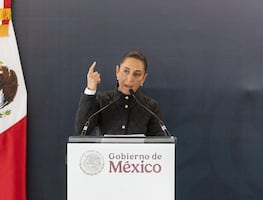Más Información

Óscar Rentería Schazarino, ha operado contra CJNG, Viagras y Templarios; es el nuevo secretario de Seguridad en Sinaloa

Claudia Sheinbaum pide respeto para Maru Campos; gobernadora anuncia acuerdo para transporte público

Claudia Sheinbaum anuncia los Centros de Cuidado Infantil en Chihuahua; inaugura hospital en Ciudad Juárez

T-MEC no se debe concebir como un subsidio para México, afirma Sheinbaum; tratado aumentó 48% el comercio desde 2020
The fight against corruption is an issue which has been present for decades in the public opinion without ever reaching a positive conclusion.
All the way from the promised “moral renovation of society” during the 80's, progress has been slow. Probably the creation of the Ministry of the Comptroller's Office – now Ministry of Public Administration – and the law on transparency are the better-known measures taken in this regard. However, while the goal of the Ministry is to supervise the use of public funds, the Ministry still belongs to the structure of the government; it's both judge and jury. And as for the law, the requests of those seeking access to official information are often rejected as the documents have been stamped as “classified.”
In recent years, the fight against corruption has been led by social organizations and has since met with resistance.
During an interview published today in this newspaper, Marieclaire Acosta – who as of this morning is the President of the Citizen Participation Committee of the National Anti-Corruption System (SNA) – has signaled political parties as one of the biggest obstacles in the appointment of key personnel for the system – among them the anti-corruption prosecutor and magistrates.
If some of the prior obstacles have budged it is as a result of the pressure exerted from the trenches seeking to lay the ground to build institutions capable of changing the performance of public administration in Mexico.
Even though an anti-corruption system was one of the goals of the current administration proposed at the very beginning, we're nearing its end and the system hasn't been able to be fully implemented. The will of politicians in this regard hasn't been enough given the demand of an engaged society for a transformation in the way public funds are managed.
Jailing governors accused of embezzlement is a huge step but social organizations need to get closer in order to ensure federal budgets are properly spent. In this type of crusades, no government should cast aside its citizens.
Like Acosta says, corruption has an impact in many areas: economy , security, trust in the institution system, and the environment. This is why it's important to stop it firmly.
No country will ever be fully free of corruption acts but countries with tight supervision controls have managed greater development levels. The political class should not stand in the way of us reaching this destination.
am






